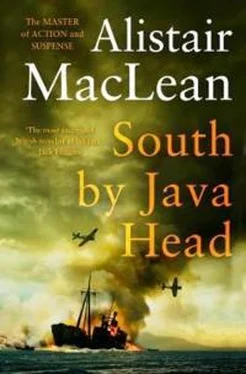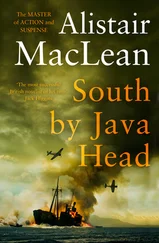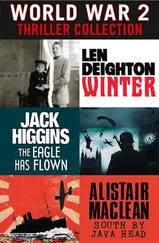“Or they can die out here. They can take their choice.” Nicolson leaned yet more heavily on the rifle and his forefinger began to whiten on the trigger. “But not until you go first.”
Thirty seconds later the room was still and almost empty, three men only sitting at the head of the banqueting-table. Eleven men were jammed into the tiny cloakroom, and the door was locked against them. McKinnon was pressed flat to the wall close by one of the open double doors, and Nicolson was in the open doorway that led into the side passage. He was placed so that he could see the entrance to the double doors through the crack between his own door and the jamb. He was also placed so that the rifle in his hand was lined up on the centre of Colonel Kiseki’s chest. And Colonel Kiseki had had his orders. He’d had his orders, and Colonel Kiseki had lived too long, had seen too many desperate and implacable men not to know that Nicolson would shoot him like a dog even on the suspicion, far less the certainty, that he was being double-crossed. Colonel Kiseki’s reputation for cruelty was matched only by his courage, but he was no fool. He intended to carry out his orders implicitly.
Nicolson could hear young Peter crying, a tired, dispirited wail, as the soldiers crossed the gravel and mounted the steps to the portico, and his mouth tightened.
Kiseki caught his look and his muscles tensed in expectancy, waiting for the numbing crash of the bullet, then saw Nicolson shake his head and visibly, consciously relax. And then the footsteps had crossed the hall, halted at the doorway, then advanced again as Kiseki shouted out an order. A moment later the Japanese escort – there were six of them altogether – were inside the room, pushing their prisoners in front of them.
Captain Findhorn was in the lead. A soldier held him by either arm, his legs were dragging and he was ashen-faced and drawn, breathing quickly, hoarsely and in great pain. As soon as the soldiers halted they released his arms. He swayed once backwards, once forwards, his bloodshot eyes turned up in his head and he crumpled and folded slowly to the floor, fading into the merciful oblivion of unconsciousness. Gudrun Drachmann was directly behind him, Peter still in her arms. Her dark hair was tangled and dishevelled, the once-white shirt ripped half-way down her back. From where he stood, Nicolson couldn’t see her back, but he knew the smooth skin would be pock-marked with blood, for the soldier behind had his bayonet pressed into her shoulders. The impulse to step out from behind the door and empty the automatic rifle’s magazine into the man with the bayonet was almost overwhelming, but he crushed it down, stood where he was, still and quiet, looking from Kiseki’s impassive face to the smudged, scarred face of the girl. She, too, Nicolson could see now, was swaying slightly, her legs trembling with weariness, but she still held her head proudly and high.
Suddenly Colonel Kiseki barked an order. His men stared at him, uncomprehending. He repeated it almost immediately, smashing the flat of his hand down on the table before him, and at once four of the six men dropped the arms they were carrying on to the parquet floor. A fifth frowned in a slow, stupid fashion, as if still unwilling to believe his ears, looked at his companions, saw their arms on the floor, opened his hand reluctantly and let his rifle crash down on the floor beside the weapons of his comrades. Only the sixth, the man with the bayonet in Gudrun’s back, realised that something was very far wrong. He dropped lower into a crouch, glanced wildly round then collapsed to the floor like a stricken tree as Telak came up feather-footed from the hall behind him and smashed his rifle down on the unprotected back of the soldier’s head.
And then Nicolson and McKinnon and Telak were all in the room, Telak herding the five Japanese soldiers into a corner, McKinnon kicking the double doors shut and keeping a wary eye on the three men at the table, Nicolson unashamedly hugging the girl and the young boy still in her arms, smiling his delight and immense relief and saying nothing, while Gudrun, stiff-backed and straight, stared at him, for a long, long moment in uncomprehending wonder and disbelief, then sagged heavily against him, her face buried in his shoulder, murmuring his name over and over again. McKinnon was looking at them from time to time, grinning hugely, all the savage anger gone from his face. But he didn’t look at them for more than a fraction of a second at a time, and the muzzle of his gun never wavered from the three men at the top of the table.
“Johnny, Johnny!” The girl lifted her head and looked at him, the intensely blue eyes now shining and misted, rolling tear-drops cutting through the dark smudges on her cheek. She was shivering now, shivering from reaction and from the cold of her wet rain-soaked clothes, but she was quite oblivious of all that.
The happiness in her eyes was something that Nicolson had never seen before.
“Oh, Johnny, I thought it was all finished. I thought that Peter and I–” She broke off and smiled at him again. “How in the world did you get here? I– I don’t understand. How did you?”
“Private aeroplane.” Nicolson waved an airy hand. “It was no trouble. But later, Gudrun. We must hurry. Bo’sun?”
“Sir?” McKinnon carefully removed the smile from his face.
“Tie up our three friends at the head of the table there. Their wrists only. Behind their backs.”
“Tie us up!” Kiseki leaned forward, his fists clenched on the table top. “I see no need–”
“Shoot ’em if you have to,” Nicolson ordered. “They’re no use to us any more.”
He thought it as well not to add that Kiseki’s usefulness was yet to come but feared that the knowledge of his intentions might provoke the man to an act of desperation.
“Consider it done, sir.” McKinnon advanced purposefully towards them, tearing down several mosquito curtains as he passed. Twisted, they would make excellent ropes. Nicolson turned away from Gudrun after seeing her and Peter into a chair, and stooped low over the captain. He shook him by the shoulder and Findhorn finally stirred and wearily opened his eyes. Aided by Nicolson he sat up, moving like a very old man and gazed slowly round the room, comprehension slowly dawning on his exhausted mind.
“I don’t know how on earth you did it, but well done, my boy.” He looked back at Nicolson, inspected him from head to toe, wincing as he saw the cuts and savage burns on his chief officer’s legs and forearms. “What a bloody mess! I hope to God you don’t feel half as bad as you look.”
“Top of the world, sir,” Nicolson grinned.
“You’re a fluent liar, Mr. Nicolson. You’re as much a hospital case as I am. Where do we go from here?”
“Away, and very shortly. A few minutes, sir. Some little things to attend to first.”
“Then go by yourselves.” Captain Findhorn was half-joking, wholly earnest. “I think I’d rather take my chance as a prisoner of war. Frankly, my boy, I’ve had it, and I know it. I couldn’t walk another step.”
“You won’t have to, sir. I guarantee it.” Nicolson poked an inquiring toe at the bag one of the soldiers had been carrying, stooped and had a look inside.
“Even brought the plans and the diamonds right here. But then, where else would they bring them? I hope, Colonel Kiseki, that you hadn’t set your heart too much on these?”
Kiseki stared at him, his face expressionless. Gudrun Drachmann drew in a quick breath.
“So that’s Colonel Kiseki!” She looked at him for a long moment, then shivered. “I can see that Captain Yamata was right enough. Thank God you got here first, Johnny.”
“Captain Yamata!”. Kiseki’s eyes small enough normally in the folds of fat, had almost vanished. “What happened to Captain Yamata?”
Читать дальше
Конец ознакомительного отрывка
Купить книгу










